Iranian Football Coach Criticizes Regime Censorship
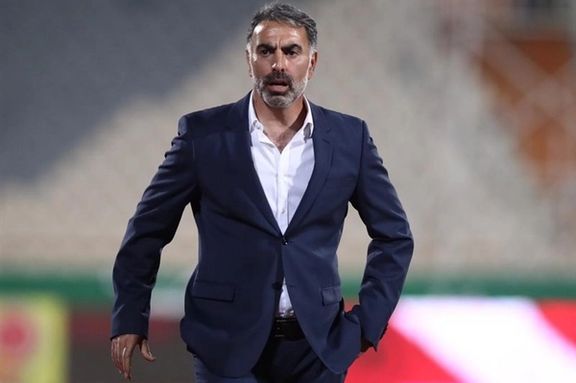
An Iranian football coach has expressed criticism regarding sport censorship in Iran after coverage of a female referee raising the hand of a male wrestler was banned from TV.

An Iranian football coach has expressed criticism regarding sport censorship in Iran after coverage of a female referee raising the hand of a male wrestler was banned from TV.
Mahmoud Fekri, who serves as the head coach of Havadar football club, voiced his concerns on Tuesday, noting the scene's ban from state TV.
The incident occurred at the Belgrade Wrestling World Championships, during which a female referee raised the hand of Iranian wrestler Hassan Yazdani.
Iran's state TV is tightly controlled by the office of Iran's authoritarian leader, Ali Khamenei, and has been experiencing a decline in viewership due to its extensive religious programming and heavy-handed censorship of news. Critics argue that it serves primarily as a propaganda tool, benefiting from significant government subsidies without any accountability.
Athletes have come under fire in the last year for supporting protests. Those who have spoken out have undergone social media bans, bank account freezes and even pay cuts. Those who have competed without hijab on the world stage have either been forced into exile or arrested and dealt severe legal consequences.
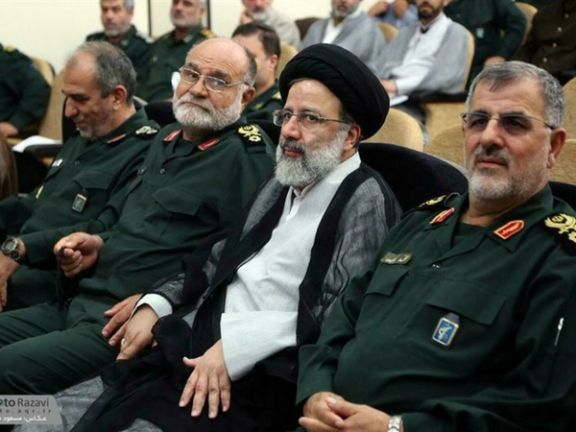
The Council on Foreign relations has changed an earlier announcement of cancelling a meeting with Iranian President Ebrahim Raisi in New York, and re-scheduled it to Wednesday.
Iran International’s correspondent Arash Alaei earlier reported from outside the CFR offices in New York City that representatives of the organization told reporters gathered there that a private meeting with Raisi and invited guests had been canceled.
However, later in the day, CFR said that the meeting will take place on Wednesday at the request of the Iranian team, at Raisi's hotel, the Hilton Millennium at UN Plaza, at 11 am. The hotel is located at a cordoned-off area, as protest gatherings had been planned outside the original venue, the CFR building.
On September 9, Roya Hakakian, a CFR member and an Iranian-born writer and activist revealed that she had received an invitation to attend the meeting but had declined. In her response to CFR, she cited that the Iranian president stands accused of serious human rights violations, particularly having been a member of a secret “death commission” that ordered the killing of up to 5,000 political prisoners in 1988.
“Dialogue is reserved for those with whom we have disagreements. For criminals like Raisi, the only venue for conversation must be a court of law,” Hakakian wrote to CFR.
But Hakakian and many other Iranian Americans were furious not just for Raisi’s culpability in one crime in 1988, but also for his role and responsibility as President during the Women, Life, Freedom protests that rocked Iran after Mahsa Amini’s death in hijab police custody last year.
Another prominent Iranian dissident figure, Nazanin Boniadi, also posted on X Tuesday that she was also invited but declined.
“Democratic institutions hold the key to tipping the balance of power in favor of those risking everything for freedom. If you afford your members the opportunity to meet dictators behind closed doors, then at least offer them the chance to also hear from their opponents in the open,” she said in her post.
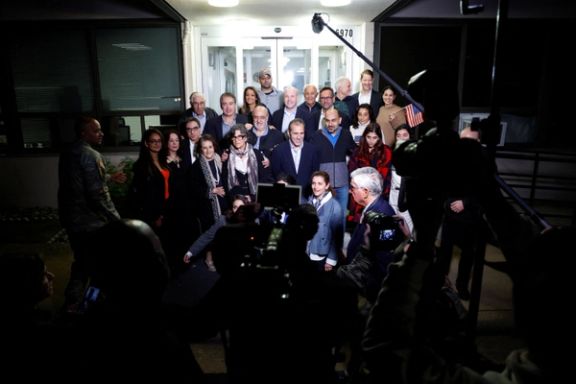
Five Americans held hostage in Iran arrived in the United States Tuesday, one day after $6 billion in frozen Iranian oil revenues was transferred to banks in Qatar.
They made an emotional return, ending their imprisonment "nightmare", after being arrested, falsely accused of espionage and convicted in sham trials without due process of law.
Coming off the plane, the returning Americans were embraced by family and friends with smiles, laughs, and visible emotion, video footage from the airport showed. One of the returnees briefly waved a small Stars and Stripes handed to him.
"The nightmare is finally over," said Babak Namazi, speaking with his arm around his returning brother Siamak at Fort Belvoir, Virginia.
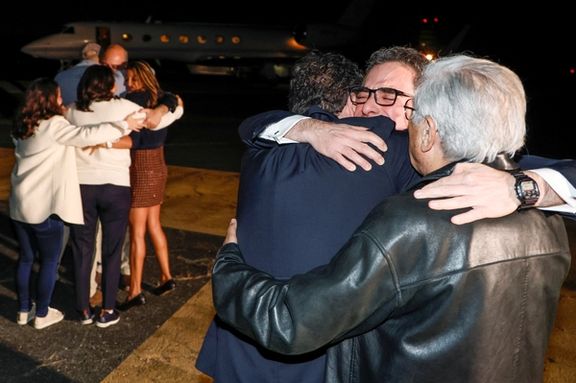
As part of the deal, five Iranians charged or convicted of non-violent crimes were also freed by the US. Only two of the five chose to return to Iran and were handed to the Iranian officials in Doha airport when the five Americans landed there.
Siamak Namazi, one of the freed Americans, issued a statement immediately after leaving Iran, in which he praised President Biden and his administration for making ‘incredibly difficult decisions’ to secure his release.
“Thank you... for ultimately putting the lives of American citizens above politics,” Namazi said in his statement.
Not everyone was so thankful, however.
Gazelle Sharmahd, whose father Jimmy, another American, was kidnapped and is on death row in Iran, issued a press release almost at the same time as Namazi.
“How does it make sense to leave hostages behind,” Sharmahd writes, “especially the only US hostage who does not hold an Iranian passport, who did not travel to Iran but was kidnapped, who was NOT sympathetic to the hostage takers…”
Addressing President Biden, she continued, “instead of wasting your time on national TV trying to convince us that our hostage takers will use the money for humanitarian reasons, explain to us how and when will you bring Jimmy Sharmahd back home to us?”
The Biden administration came under attack also from many prominent Republicans in the Capitol.
Michael McCaul, Chairman of the House Foreign Relations Committee, slammed those who have negotiated the prisoner swap on Fox News: “They are so naive... It was a hostage swap for $6 billion... It's going to go into terror proxy operations, it's going to go into building their nuclear...offensive system for a nuclear war."
Republican congressman Mike Turner was another vocal critic of the deal. Appearing on CBS, he warned of the future risks involved. “Whenever you put a price on American heads, you get an incentive for people to take more hostages.”
The exchange at the Doha airport –reminiscent of Cold-War exchanges between the US and the Soviet Union– was timed to perfection for the Islamic Republic. The hostages left Iran immediately after the anniversary of the killing of Mahsa Amini, and just as Raisi arrived in New York for the UN General Assembly.
The plight of the freed Americans is now bound to dominate airtime, diverting attention from Raisi and his regime’s brutal crackdown of every dissenting voice.
“I'm heading to New York… to tell the world not to legitimize murderous dictators like Iranian president Ebrahim Raisi,” wrote Hillel Neuer, an international human rights lawyer and the executive director of United Nations Watch.
Raisi was a member of the infamous Death Committee which oversaw summary execution of at least two thousand Iranian political prisoners in 1988.
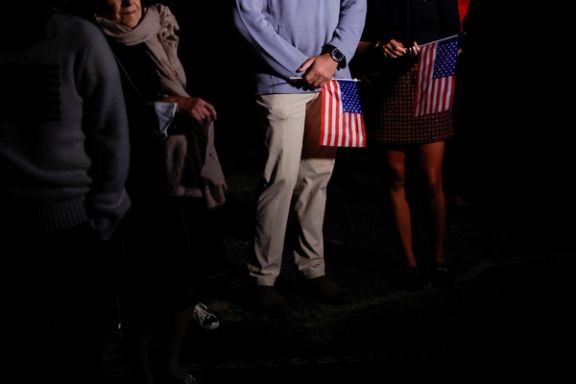
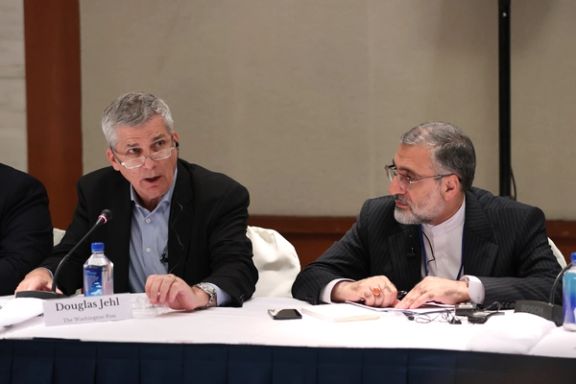
The chief of staff of Iran's president, under sanctions from both the US and EU, is accompanying the hardline President on his second consecutive trip to New York.
Gholam-Hossein Esmaili’s initial blacklisting in 2011 stemmed from his role as the head of Iran's prisons organization, where he faced accusations of "serious human rights violations."
He is under sanctions due to his involvement in the widespread detention of political protesters and his role in concealing abuses within the prison system.
Esmaili served as the spokesperson for the Judiciary of the Islamic Republic from 2019 to 2021 and held the position of Tehran Province's chief justice from April 2014 to August 2019. On August 8, 2021, he was appointed as chief of staff of Iran's president.
President Ebrahim Raisi, who is himself on the US and European sanctions lists, is currently in the US to attend the UN Assembly, a move met with global criticism in light of the country's recent crackdowns.
Prior to assuming the presidency in August 2021, Raisi served as Iran's Judiciary chief. However, his extensive career within the Islamic judiciary has drawn criticism from human rights organizations, accusing him of significant human rights violations.
He was a member of a death committee responsible for ordering the execution of thousands of political prisoners in 1988, which he openly acknowledges.
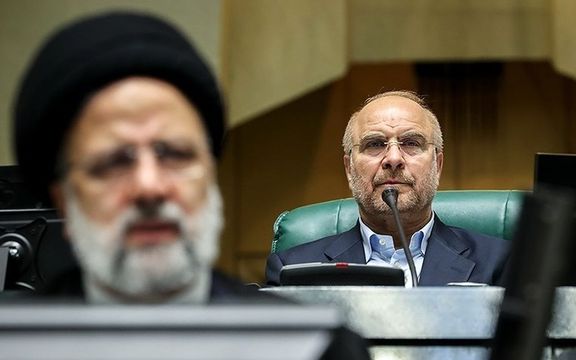
A politician close to Iran’s former Speaker Ali Larijani blames the current leader of the parliament for Iran's woes, shared with his ultraconservative rivals.
Speaking particularly about the way the Hijab Enforcement bill was handled by the parliament (Majles), Behrouz Nemati said in an interview with Khabar Online website that Speaker Mohammad Bagher Ghalibaf should accept his responsibility for handing over decision making about the bill to a committee of 15 lawmakers rather than putting it to vote by all the 290 lawmakers.
The entire Majles, including Ghalibaf are responsible for this non-democratic act, Nemati argued, one day after The Speaker criticized the Paydari party-dominated government in a bid to distance himself from the ultraconservative party and its members at the Majles. Nemati further reiterated that Ghalibaf cannot evade his responsibility for the developments at the parliament.
Nemati also cautioned against government officials manipulating data to exaggerate President Ebrahim Raisi's "achievements."
The presidential administration, which is harshly criticized for mishandling the economy and weak governance, has been making outrageous claims about reducing inflation, boosting employment and improving living standards, while tens of millions have sunk deeper into poverty.
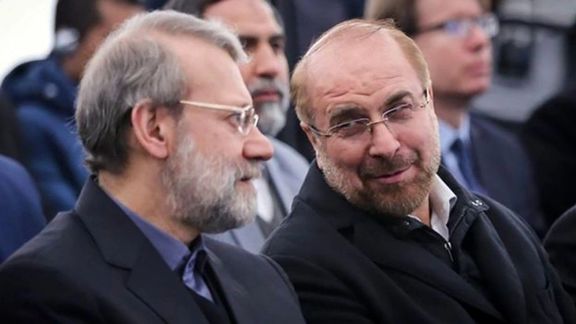
Furthermore, Nemati discussed Ali Larijani's disqualification during the 2021 presidential election, alleging that the Hojjatieh Association, acting like a powerful clan, influenced his disqualification despite his 12-year tenure as the Majles Speaker.
Hojjatieh is a fundamentalist Shia group known for its fanaticism. Even Supreme Leader Ali Khamenei does not want to appear too close to them.
Now, Larijani hesitates to announce his candidacy for the March 2024 parliamentary elections due to concerns that the Guardian Council may disqualify him once more. Ultimately, the Council obeys Khamenei, and only his approval can secure Larijani's candidacy.
Regarding the upcoming elections, Nemati mentioned that approximately 800 reformists have registered to run. These candidates include conservatives aligned with Expediency Council member Mohammad Javad Bahonar, moderate conservatives close to Larijani and former President Hassan Rouhani, as well as neo-cons affiliated with Ghalibaf - all competing against the ultraconservative Paydari Party members.
In an interview with Rouydad24, lawmaker Morteza Mahmoudvand remarked that "Iranian politicians lie about their affiliation. They lie about being conservative or reformist. They all equally benefit from government resources."
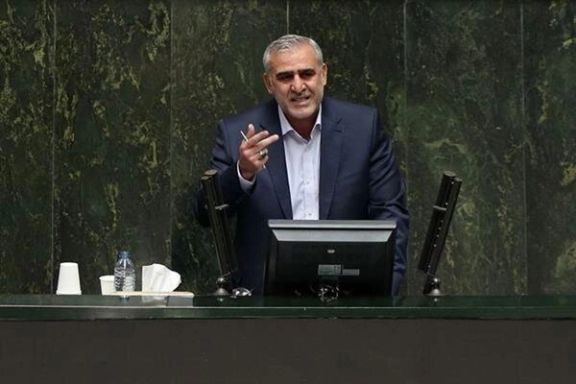
Nonetheless, he asserted, "There are infiltrators among government officials who aim to facilitate a regime change." However, he refrained from naming specific individuals, but emphasized, "Politicians hold the people's livelihood hostage to their factional interests. They should realize that without these disadvantaged citizens, there would be no country or Islamic Republic."
Mahmoudvand added that a large part of the problems in the country are created by politicians who belong to the leading political factions. They keep blaming the opposite camp for existing difficulties that might have been created even by themselves. This is childish, he said.
He expressed deep disappointment that in a country as resourceful as Iran, its citizens are unable to afford medical treatment. He criticized government officials for refusing to admit their shortcomings and the ineffectiveness of their management approach.

In spite of having one of the world's worst records for human rights, Iran's president told the UN's secretary general that attention to women's rights are “unparalleled” in the Islamic Republic.
His remarks come in the wake of more than one year of women-led protests in the country, dubbed Woman, Life, Freedom, in which the nation has fought back against the mandatory headscarf and widespread oppression against women and minorities. He spoke just hours after a prisoner swap deal that saw $6 billion released by the United States and five regime-affiliated convicts in the US freed from prisons.
Ebrahim Raisi claimed that the presence of Iranian women and girls in various fields such as science, sports, social, and cultural activities shows the nation's attention to women's rights, in remarks made to UN Secretary General Antonio Guterres ahead of the General Assembly.
"The Islamic Republic is ready to cooperate with the United Nations for the promotion of peace and security in the world and to prevent oppression against nations," he added.
His claims come as an earlier report by the US-based Human Rights Activists News Agency (HRANA) has described the situation of women in Iran as “dire”.
With women having been at the forefront of anti-regime protests, burning headscarves and cutting hair in protest against the oppression of the Islamic Republic, the rights group said, "at least 3,953 women were arrested, of which 1,019 were identified by HRANA, [and] 160 of them were female university students.”
According to HRANA, since September's unrest, at least 2,003 women were reprimanded in different ways, including being summoned to police authorities, due to the improper wearing of the hijab.






